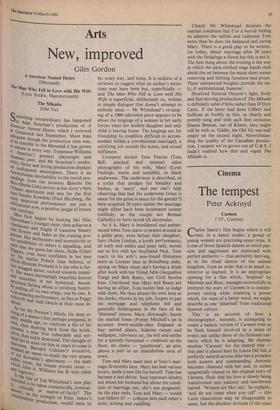Arts
New, improved
Giles Gordon
A Streetcar Named Desire (Mermaid) The Man Who Fell in Love with His Wife (Lyric Studio, Hammersmith) The Mikado (Old Vic)
Something extraordinary has happened to Alan Strachan's production of A Streetcar Named Desire, which I reviewed at Greenwich last September. More than adequate though the production then was, in its transfer to the Mermaid it has grown in stature in every way. Tennessee Williams is America's greatest playwright and dramatic poet,
wittY, funny and Mr Strachan's tender, and loving production displays an undisputed masterpiece. There is an Aeschylusian inevitability to the torrid pro- ceedings from the moment Bjanche Du (Sheila Gish) arrives at her sister's New
tinOrleans apartment and sees for the first time Stanley Kowalski (Paul Herzberg, the wild Stanley improved performance: not just a and cunning)d animal now, a positive jungle of brawn
Miss Gish begins by looking like Miss Haversham's young that er sister, then achieves a translucent and fragile if transient beauty
flowers and fades as the evening pro- gresses. Her tactlessness and insensitivity to the sensibilities of others is appalling, and each time she gores her sister, Stella (Clare Iggins, even more confident in her love Mach the macho Polack than before), or 1,,Itch (Duncan Preston) it is she who is fur- Liner,diragged down, sucked towards insani- Y. She wears increasingly beautiful dresses and resembles in her hysterical, booze- saturated flailing about a ravishing butter- illsY Pulling off its own wings, one by one. It arnazing performance, as fine as Peggy sPired. ncroft and Judi Dench at their most in- chA. s for Mr Preston's Mitch, his deep et- earlY
ing of a mama's boy perhaps prepared, in middle age, to confront a life of hi p‘ e rvrl ts
sen then drawing back from the brink,s man first vulnerable and sen- ,"e, then sickly destroyed. The thought of wrearlat lies in store for him in years to come is detrs:?rne. Bernard Culshaw's evocative, or detailed set seems to exude the very aroma public Kowalski's apartment — the male wnieltic r°0111, the female private room — arid ingenuity. intIesn t entitle of Ted Whitehead's new play de to be taken romantically, ironical- -swercYaicllY or matter-of-factly? The •
?n the strength of Peter James's 4,-tentious production, would seem to be: every way, and none. It is reckless of a reviewer to suggest what an author's inten- tions may have been but, superficially and The Man Who Fell in Love with His Wife is superficial, deliberately so, written in simple dialogue that doesn't attempt to embody ideas — Mr Whitehead's revamp- ing of a 1980 television piece appears to be about the longings of a woman in her early forties when her student daughter and only child is leaving home. The longings are for friendship (a condition difficult to accom- modate within a conventional marriage), a satisfying job outside the home, and sexual fulfilment.
Liverpool docker Tom Fearon (Tom Bell, pinched and intense) takes photographs of his wife, Mary (Lynn Farleigh, warm and sensible), in black underwear. The underwear is described, in a script that dredges for banality and bathos, as 'saucy', and one can't help observing that had the underwear (what is sauce for the geese is sauce for the gander?) been acquired 20 years earlier the marriage might either have been terminated sooner (unlikely, as the couple are Roman Catholic) or have lasted till doomsday.
As it is, Mary is bewildered and embar- rassed when Tom starts to prance around as a giddy goat, even before their daughter, Susy (Anna Lindup, a lovely performance, all teeth and smiles and pony tail), moves out to live with her boyfriend Nick. Tom reacts to his wife's new-found liberation more as Leontes than as Strindberg male, spying on Mary when she's having a drink after work with her friend Julia (Jacqueline Tong) and Bob Reece, her Civil Service boss. Convinced that Mary and Reece are having an affair, Tom invites him to lodge with them. He then abuses his own boss at the docks, throws in his job, forgets to pay the mortgage and telephone bill and generally disintegrates in the face of his 'liberated' missus. Mary, distraught, leaves the marital home (Poppy Mitchell's set is accurate lower-middle-class England at bay: potted plants, hideous carpet and wallpaper, television set, the lot) and settles for a sparsely furnished — cushions on the floor, no chairs — 'penthouse', an attic above a pub in an insalubrious area of town.
Tom and Mary meet next at Susy's mar- riage 20 months later. Mary has had various lovers, made a new life for herself. Tom has become a taxi driver. Susy expresses doubts not about her husband but about the condi- tion of marriage (no, she's not pregnant). As the play ends, Tom and Mary — would you believe it? — collapse into each other's arms, kissing and cuddling. Clearly Mr Whitehead despises the marital condition but I've a horrid feeling he admires the selfish and ludicrous Tom more than he does the balanced and caring Mary. There is a good play to be written, for today, about marriage after 20 years with the fledglings a-flown but this is not it. The best thing about the evening is the way in which the dark-clothed stage hands steal about the set between the many short scenes removing and shifting furniture and props. These unexpected burglars provide the on- ly, if unintentional, humour.
Stratford Festival Ontario's light, lively and fast-moving production of The Mikado is definitely table d'hôte rather than D'Oyly Carte. If the latter had done Gilbert and Sullivan as freshly as this, as clearly and prettily sung and with such fine costumes (Susan Benson, out of Klimt), they might still be with us. Oddly, the Old Vic was half empty on the second night. Notwithstan- ding the quality of the Canadian produc- tion, I suspect we've grown out of G & S. I hadn't realised how thin and vapid The Mikado is.






































 Previous page
Previous page